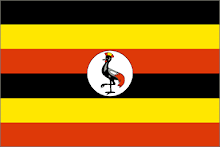For procedural reasons, the judgment was not read until Monday. The appellant in the case, a woman who had worked as an employee of the state house, had been convicted in a lower court of embezzling millions of Ugandan shillings (thousands of dollars).
Government embezzling has become so prevalent in this country that an Anti-Corruption Court was recently instituted to handle these crimes exclusively. Given the woman’s political ties, the case was at least a blip on the political radar. Given his history of judgments in politically sensitive cases, I imagine it was a stressful decision for Justice Lugayizi.
***
In 2005 as democratic elections were approaching in Uganda, the incumbent, President Yoweri Museveni rescinded presidential term limits, allowing him to run for a third term in office. Because there were no other candidates with significant support, the move seemed effectively to extend his presidency.
That November, Kizza Besigye, a man who had opposed Museveni in the 2001 elections and had fled to South Africa in exile after treason allegations, returned to oppose Museveni again in 2006. He posed the only potential threat to Museveni’s re-election.
Upon his return to Uganda, Besigye was arrested and charges of treason and rape, both crimes punishable by death, were brought against him. For crimes that carry a possible death sentence, bail is not typically granted until after the accused has been detained for six months. That six-month term would have kept Besigye in prison until after the presidential elections.
On November 16, 2005, the High Court heard the bail application of Besigye. Justice E.S. Lugayizi presided.
As Justice Lugayizi was ruling that the Constitution of Uganda guarantees the right to bail, a group of heavily-armed men wearing black t-shirts surrounded and stormed the High Court, re-arresting Besigye. President Museveni publicly censured Justice Lugayizi the next day, saying that his decision to grant bail was improper. On that same day, the Daily Monitor’s front page showed the armed men in black shirts as they arrested Besigye, labeling them the “black mambas.”
The raid on the High Court was criticized both locally and internationally. The Principal Judge of the High Court described the incident as a “naked rape defilement and desecration of our temple of justice.” The Constitutional Court later held that the raid was illegal and unconstitutional. It subsequently affirmed that Justice Lugayizi’s original ruling had been proper.
The rape charges against Besigye were dropped and an army tribunal on the treason charge, also ruled unconstitutional by the High Court, was ultimately suspended by Museveni. Shortly thereafter, Museveni won the election, securing more than 80% of the vote. President Museveni has been president now for 23 years.
***
At the reading of the judgment in the embezzlement case on Monday, the appellant seemed disinterested in the proceedings and did not react when Justice Lugayizi addressed the decisive issue in the case. I thought perhaps she did not understand the judgment as it was being read, but then I remembered that she previously served as a legal adviser to President Yoweri Museveni, so that wasn’t it. Perhaps she felt the verdict was a foregone conclusion and the lower court’s judgment against her would be upheld. Maybe she was supremely confident that she would be exonerated.
Ultimately, Justice Lugayizi reversed the decision of the lower court, and the woman was acquitted of the 13 charges brought against her. Only after the entire judgment had been read did she rejoice.

No comments:
Post a Comment